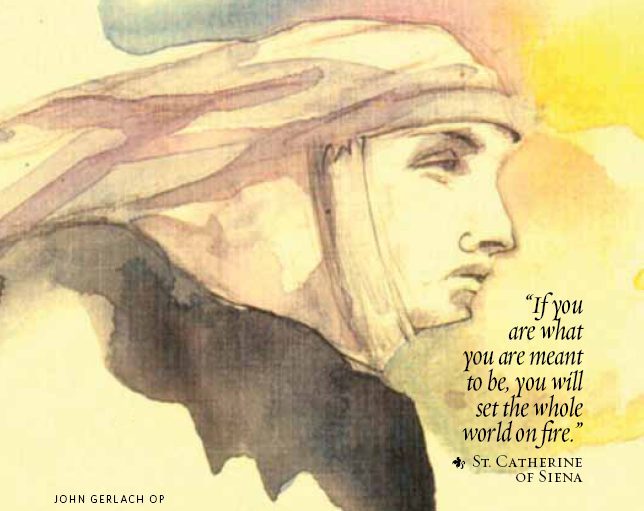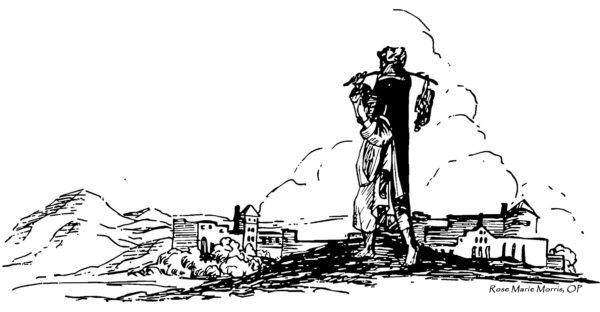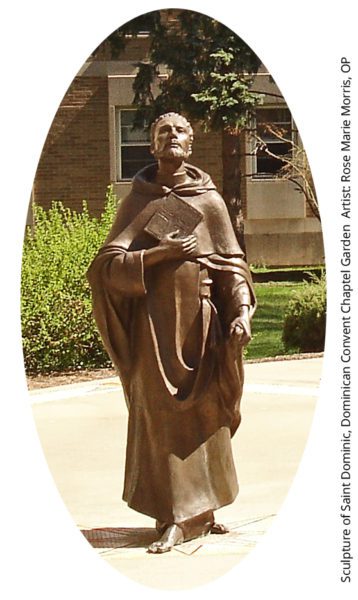
Dominican Spirituality
Tap into the Dominican tradition
by Sister Margaret Palliser, OP
Like many young women who felt the stirrings of a religious vocation, I turned to the community that had taught in my school. The Sisters were prayerful, joyful, compassionate, and seemed always to be so enthusiastic about whatever they were doing. Who better to be my companions in my journey to serve God as a Sister?
It was only later as a young novice that I began to ponder what it really meant to be a Dominican. I quickly learned that if you put five Dominicans in a room and ask them what the Dominican charism is, you will probably get more than a dozen answers! The multiple answers would reflect not simply the Dominican penchant for defining things, but also the fact that the Dominican charism has been and must be embodied in myriad ways throughout history. While they would look to St. Dominic himself, they would also point to some of the many other great figures in the Dominican family — Thomas Aquinas, Catherine of Siena, Fra Angelico, Meister Eckhart, Bartolomé de las Casas, Rose of Lima, Martin de Porres, Yves Congar — each a uniquely true expression of the charism and spirituality of the founder of the Order of Preachers, aka the Dominicans.
Who was Dominic?
The son of noble parents, Dominic de Guzmán was born around 1170 in the small town of Caleruega in the kingdom of Castile in Spain. The young Dominic studied under the guidance of an uncle priest, eventually entering the University of Palencia to prepare for the priesthood.
As a student, Dominic was quickly distinguished for his interest in the study of Sacred Scripture and his genuine love of people, especially his deep compassion for the poor and unfortunate. To aid the victims of the 1191 famine in Spain he sold his furniture, clothing, and even his most precious possessions — his theology books. Twice he even tried to obtain the release of slaves held captive by the Moors by offering himself in exchange for their release.
 In 1204, after 10 years as a priest at the Cathedral of Osma, Dominic made a journey as a diplomatic envoy with his bishop and encountered the Cathars, a heretical sect widespread in southern France. Seeing that many Christians in the region were adopting some of their false teachings (e.g., that the created material world — including human beings — is evil), Dominic got the idea to begin a new Order devoted to combating such heresies through preaching the truth: the goodness of creation, the beauty of the human person made in the image of God, and the compassionate mercy of God.
In 1204, after 10 years as a priest at the Cathedral of Osma, Dominic made a journey as a diplomatic envoy with his bishop and encountered the Cathars, a heretical sect widespread in southern France. Seeing that many Christians in the region were adopting some of their false teachings (e.g., that the created material world — including human beings — is evil), Dominic got the idea to begin a new Order devoted to combating such heresies through preaching the truth: the goodness of creation, the beauty of the human person made in the image of God, and the compassionate mercy of God.
Study was a high priority for Dominic. So that they might be able to effectively argue against heretical teachings, he insisted that the members of his fledgling community immerse themselves in serious study of Sacred Scripture, philosophy, and theology, as well as the secular arts and sciences of the medieval world. For Dominicans, all paths to truth lead to God. So, the early friars were sent to study at the great universities that were emerging in Paris, Bologna, and Oxford at that time. There, Dominicans like Albert the Great and Thomas Aquinas came to be recognized as leading scholars and theologians.
Like Jesus himself, Dominic was a man on fire with the Gospel, the “good news” of God’s mercy and compassion as revealed in Jesus. Despite having no converts during their early years, Dominic and his companions persevered with joy, enthusiasm, and a confident trust in God’s providence — and their preaching and teaching eventually blossomed in the Dominican family. By 1206 he had founded the first community of Dominican nuns, and in 1216 he received papal approval for an Order of Preachers.
Hallmarks of the Dominican search for truth
These are some hallmarks of the Dominican passion for truth and compassion for humanity:
Freedom and fearlessness
French Cardinal Jean-Marie Villot once described Dominic as a man who was “stupefyingly free,” and the spirit of freedom as deeply stamped on the whole Dominican tradition. Because the search for truth is always the search for God, Dominicans do not fear to go wherever the truth leads them. Veritas (“Truth”) is even one of the mottos of the Dominican Order.
While it is clear that, for Dominicans, the word of God is found in Sacred Scripture in a privileged way and that God’s “best word” about God’s self (and about us) is incarnated in the person of Jesus Christ, it is also true that Dominicans have always recognized that God’s “word” is also spoken in all of creation. By attentive presence to the world and respect for created reality in its own right, they contemplate the word of God revealed in the world, i.e., in history and in the goodness of creation.
Accordingly, Dominican spirituality and intellectual life are world-embracing, sweepingly inclusive. No field of study is excluded. Those who would follow Dominic search every aspect of creation to discover and understand the truth that God wishes to speak there. Dominicans are to be found in every field of study — from the Irish Dominican archaeologist working in the lands of the Bible to the young Norwegian Dominican sister working on a research project in experimental particle physics at the CERN laboratory outside Geneva, Switzerland.
Speaking truth to power
For Dominicans, compassion for humanity manifests itself as an attitude of availability in service to others, a reaching out to a world in need. The Dominican charism is about bringing the light of truth to those who are in a position to make the world a better place. Perhaps the 17th-century French Dominican Henri Lacordaire expressed it best when he said, “I venture to say that I have received from God the grace to understand this century, which I have loved so much, and to give the truth a complexion which will touch the hearts and minds of a great many people.”
The list of Dominicans who have fearlessly spoken truth to power includes luminaries such as St. Thomas Aquinas, who brought the riches of Aristotelian thought to the West; St. Catherine of Siena, who dared to challenge kings and even the pope; Dominique Pire, whose work helping post-World War II refugees was recognized with the Nobel Peace Prize in 1958; and Louis-Joseph Lebret, whose experience with poor fishermen in France led to his leadership in crafting Catholic social teaching on economic development based on human needs rather than on profit.
Joyful “preaching”
 For Dominicans, compassion for humanity leads to preaching by word and by deed. Like St. Paul, they see preaching as a necessity. For
For Dominicans, compassion for humanity leads to preaching by word and by deed. Like St. Paul, they see preaching as a necessity. For
“everyone who calls on the name of the Lord will be saved. But how can they call on Him in whom they have not believed? And how can they believe in Him of whom they have not heard? And how can they hear without someone to preach? And how can people preach unless they are sent?” (Romans 10:13-15).
And how can we preach without a pulpit? In the most powerful way possible — from the pulpit of our lives! While some are called to formal preaching, all of us are called to preach the Good News of the Gospel. The Spirit wants to preach in us — in words, in actions, in our very beings, by developing and sharing the gifts God has given to each of us. That’s why we can say that artist Fra Angelico preached with his frescoes!
The very heart of the Dominican charism is the preaching — the joyful proclamation of the truth of God’s reign of mercy and compassion. And Dominican preaching is grounded in trust—because a humble trust in God is the only truthful assessment of one’s real situation. Trust, like truth, makes us free, confident enough to take the risk of trusting in God and in the goodness and generosity of others. And such trust gives rise to joy, optimism, and hope. We use our gifts (e.g., Aquinas’ intellect, Catherine’s persuasive letter-writing, Lebret’s skills of social analysis, etc.), and we continue to contribute our labor even when we are not able to see its fruitfulness. We trust that to God’s providence.
To be a word of God’s compassion in the world
Dominican spirituality is a call to understand the ways that God is speaking to us and to our world by listening to God’s word as it comes to us in the liturgy and in our personal prayer, and by pondering every source of truth available to us in Sacred Scripture, in Church doctrine, in the tradition of wisdom that has been preserved in books, and in the new wisdom that we find emerging from our experience.
Above all, followers of Dominic focus on the truth of God’s word revealed in Jesus. They strive to live in that “word” — to study it, to contemplate it, to celebrate it, and to speak it to a world that longs for good news. They hunger to know, to experience Jesus. And from that deep personal experience, they are empowered to speak God’s word of mercy to our world, to announce that good news as living, incarnated “words” of God’s compassion to our world. They come to understand that God’s compassion is lived and announced in each of us, in our relationships with others, in our very lives. In other words, we ourselves are to be events of God’s mercy.
© 2011, Catholic Digest, March 2011
